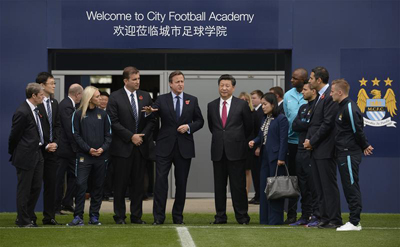Special Report – The rise of China in world football
July 28, 2016
‘New markets‘ has always been a buzzword for football clubs – but the emergence of China as a football market has sparked a once in a generation land grab across the major European football clubs. Ask all international marketing directors of those clubs on their plans, and securing a fan base in China will likely be their number one priority.
China’s huge one billion population are arriving online – and many of them are European football fans, and clubs are eager to talk to them, and harness their new spending power.
Senior Development Manager at FIFA, Mike Pfister, outlined how China’s economic strength has underpinned football’s growth in the region:
“In terms of the masses that support the sport, China is already a global power. Some of our European clubs would dream to have some of the fan bases that the Chinese clubs have. In many ways, it is already a power.”
“Football is a global phenomenon, but football trends also follows economic trends. So Asia is looking like one of the key points on the radar. That’s not only because of the talent that you see which is growing with momentum, but also it is backed by financial might, and high growth rates within this market. That’s a very good ingredient to the popularisation of football.”
While European clubs are looking to Asia, the reverse can be said as well. More and more European football clubs are being taken over by Chinese owners. Perhaps one of the most significant recent takeovers came at Inter, one of the biggest world football brands. Richard Lamb, International Business Director at Inter, admitted the takeover was a game changer:
“It’s a huge opportunity for us.” He said. “I think China is a huge opportunity for many European football clubs, and China’s largest retailer is now the owner of the club. That opens a lot of doors in China,not only from a business perspective, but also it helps us to develop a Chinese narrative,it helps us get closer to the fans, and it helps us get much more access to political bodies, but also to businesses in Asia as well”

Crucial to achieving that is understanding how the Chinese talk about football, and embracing platforms on which they do it on, particularly Weibo. Clubs are scrambling to get on the platform, which boasts a market penetration similar to Twitter in the United States. Leicester City went on the platform in March. Commercial Director Ian Flanagan outlined why it was so important:
“China is obviously a hugely important market for us, with an enormous audience that wants to talk to us, and we want to talk to them in a meaningful way.”
As exciting as China’s role in football is now, experts are unanimous – they are just getting started.
Professor Simon Chadwick of Salford University, a leading expert in sports marketing, explained that China are in it for the long haul, and that their role in world football is its infancy:
“There’s a lot of money involved, inevitably. There are significant investments being made… specifically into football from China. We have to understand the prominent role Asia will play in world sport over, I would say, the next 50 to 100 years.”
That view is shared by people working in China. Ma Guoli, Vice Chairman of Le Sports- one of the major Chinese new media players, who recently raised $1.2 billion in funding, believes we are still 10 years away from seeing the level of success they are aiming for.
“I think Chinese football is going through its best period.” He said. “From the top of the government, to normal people, we all love football. We have become richer and we now have a lot of money to develop football – that’s what we need: money and investment. A lot of investors have a good intention. To develop football in China, it takes more than 10 years. So I hope in 10 years we can have a successful story.”
That success could well be hosting a World Cup. Ma said he hoped the country could host the event in the 2030s or 2040s.

Former England international Mark Wright also believes China will play a prominent role in years to come. He and Michael Owen established Red Sports -aimed at improving grass roots Chinese football. Wright and Owen entered China, as they saw the opportunities that lay ahead:
Wright said “China is effectively a start up for football…. It’s not going to be an overnight job, it will be done over a number of years, they are hardly going to win the next World Cup! However over the next 30 years, they would like to host a World Cup, and be competing in them, and maybe even win. They have the population, and they have the desire. When they put their mark to something and they put their name to something that they want to achieve, inevitably the Chinese achieve it. They’re going about this in the right manner, employing the right people, doing the right things – the grassroots is where you have to develop these children.”
Chinese football is increasingly looking inwardly to develop its own game, but the Chinese population are also looking outward at the European game as well.
As wealth continues to spread throughout China, and across Asia, more and more football fans will come online, looking to engage with their favourite clubs -both local and European. For European clubs, they know they have to get their offering right, and be ready to speak authentically to a huge growing market.
{jcomments on}


